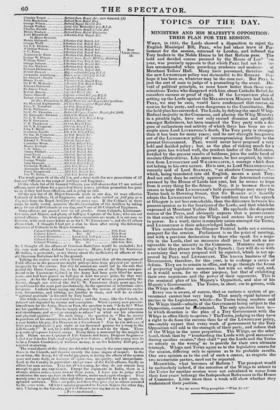TOPICS OF THE DAY.
MINISTERS AND HIS MAJESTY'S OPPOSITION:
THEIR PLAN FOR THE SESSION.
WHEN, in 1835, the Lords showed a disposition to reject the English Municipal Bill, PEEL, who had taken leave of Par- liament for the session, returned to London, and induced the Tory leaders in the Noble House to let that Reform pass. The bold and decided course pursued by the House of Lord '1st year, was precisely opposite to that which PEEL bad not lo be- fore recommended when preaching prudence and moderate . at Merchant Tailors' Hall. Many have presumed, filet-dun., Ina the new LYNDHURST policy was distasteful to Sir ROBERT. Per- haps it has been so, whatever may be the case now. But Psi. t. is Just the sort of man to judge of a proceeding by the event. De- void of political principle, as none know better than those con- scientious Tories who disagreed with him about Catholic Relief', he considers success as proof of right. If the LYNDHURST plan of setting up the Lords against the MELBOURNE Ministry had failed, PEEL, we may be sure, would have condemned that course, as unwise for his party, and even dangerous to the Constitution. But the bold plan has succeeded. The Lords, by defying the small W hig- Radical majority in the Commons, and placing the Whig Ministry- in a pitiable light, have not only caused disunion and apathy amongst Reformers, bet have inspired the Tory party with a de- gree of enthusiasm and activity of which there has been no ex- ample since Lord LIVERPOOL'S death. The Tory party is stronger than it has been for many years; and its new strength has grown out of the LYNDHURST policy of uncompromising hostility to the present Government. PEEL would never have proposed a very bold and decided policy; but, as the plan of risking much for a great gain has worked well, the prudent leader of the Moderates, fortified by the present results of boldness, joins the noble band of resolute Obstru'ctives. Like many more, he has acquired, by infec- tion from LYNDHURST and WHARNCLIFFE, a courage which does not belong to his own nature. He is now, as Lord SKELMERSDALE recently said of Lord STANLEY, " an absolute Conservative,"— which, being translated into old English, means a rank Tory. And not only does he entirely approve of the determined course pursued by the House of Lords last year, but he seems to hope from it every thing for the future. Nay, it is because there is reason to hope that LYNDHURST'S bold proceedings may carry the Tories back to Downing Street, that Sir Ronear now heartily adopts the LYNDHURST tactics. The confident tone of his speech at Glasgow is not less remarkable, than the difference between his present opinion as to the functions of the Lords, and that which he expressed at Merchant Tailors Hall. He applauds the desperate course of the Peers, and obviously expects that a perseverance in that course will destroy the Whigs and restore his own party to power. In a word, there is complete union amongst the Tories, and LYNDHURST is their acknowledged leader.
This conclusion from the Glasgow Festival holds out a curious prospect for the session. Parliament is on the point of meeting, and with a previous declaration by those who speak for a majo- rity in the Lords, that no measures shall pass but such as are agreeable to the minority in the Commons. Ministers may pro- mise what they please in the King's Speech ; they will do so with a certainty that every proposal will be rejected, which is not ap- proved by PEEL and LYNDHURST. The known business of the Government, therefore, for this year, is to undergo a series of defeats. They are to remain in office, and to go through the forms of preparing legislative measures ; but with no other end, and, as it would seem, for no other purpose, but that of exhibiting their own impotence and the power of their opponents. This is the sessional plait of his Majesty's Opposition, and also of his Majesty's Government. The Tories, in short, are to govern, with the Whigs in office.
Every one is aware, of course, that so curious a system of go- vernment cannot last very long. That nearly equal balance of parties in the Legislature, which—the Tories being resolute and the Whigs timid—admits of the Government being subject to the Opposition, cannot be Maintained. The only question then is—
in which direction is the plan of a Tory Government svith the Whigs in office likely to operate ? TheTories, judging as they have a right to do from the success thus far of the LYNDHURST policy, reasonably expect that every week of government by the Tory Opposition will add to the strength of their party, and reduce that of the Whigs in the same proportion. The Whigs, on the other hand, think that by " bombarding the Lords with good measures" during another session,* they shall" put the Lords and the Tories so utterly in the wrong" as to provide for their own ultimate triumph. Whigs and Tories agree as to the legislative course for the session, differing only in opinion as to its probable results. Our own opinion as to the end of such a course, as respects the two aristocratic parties, need not be repeated. Meanwhile, what becomes of Reform ? The prospect would be melancholy indeed, if the intention of the Whigs to submit to the Tories for another session were not calculated to rouse from their four years' lethargy the Independent Reformers in the House of Commons. Little more titan a week will show whether they understand their position.
• See the recent Whig pamphlet—" What Nu >1?"


























 Previous page
Previous page